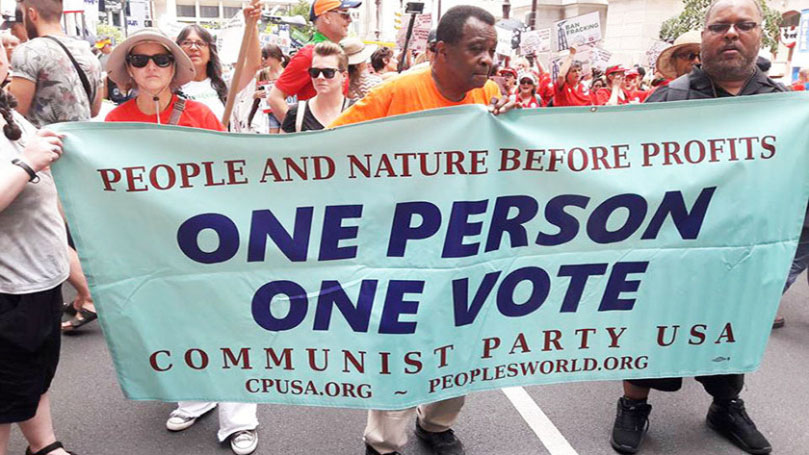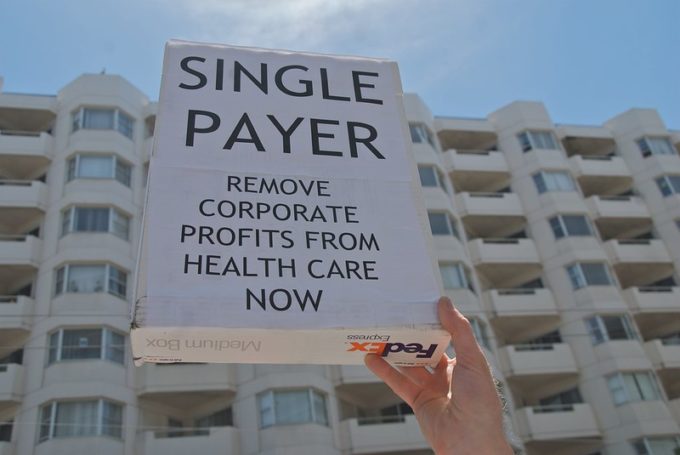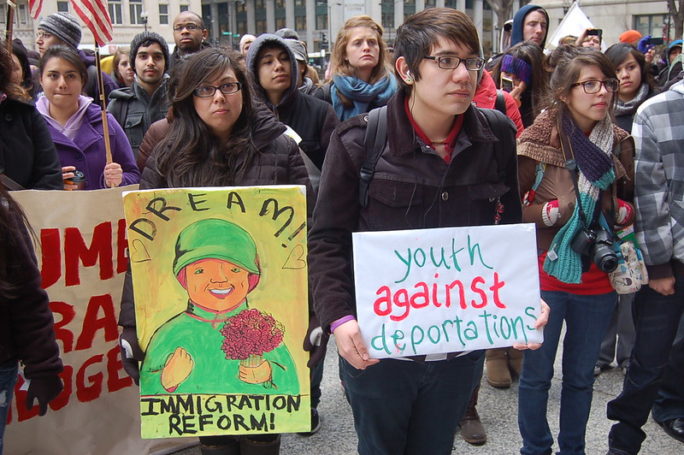
The following is an interview by AKEL, the Progressive Party of Working People in Cyprus, with Rossana Cambron and Joe Sims, co-chairs of the CPUSA.
Q: The United States is one of, if not the richest countries in the world and yet it cannot support its health-care system. What’s to blame; is it the fact that the health-care system is mainly in the hands of the private sector?
A: After the Second World War, when many other developed industrial countries were moving to create publicly owned and managed health-care systems, the United States lagged behind. In the other countries, the strong presence of the communist and socialist parties in the labor unions was the driving force behind this. But in the United States, movement in this direction was truncated by the repressive anti-communist and anti-labor political phenomenon of McCarthyism. The 1947 the Taft-Hartley law, passed by a Republican Congress over President Truman’s veto, drove the communists and the left out of most of our unions, weakened and marginalized (and in some cases destroyed) those unions which resisted, and launched a campaign of legal persecution against the CPUSA. This situation also cut unions in the United States off from unions in a number of other countries, including the socialist ones. So instead of continuing to push for a government funded and run “national health service,” unions in the United States tried to satisfy the needs of their members by negotiating agreements with employers, one by one, whereby health insurance plans are made a “fringe benefit” in negotiated contracts.

This has allowed private, corporate interests to dominate the financing of health care, with the exception of local health departments in some cities and counties. The result of this privatized system, which also includes a huge number of private hospitals and clinics run on a for-profit basis, has meant that non-unionized workers and some unionized workers have no protection because they have no contracts or very weak ones, and also that health-care costs have risen out of control, making the system far more expensive than in other wealthy countries. Aggressive neoliberal policies, especially starting with the presidency of Ronald Reagan in 1980, have greatly damaged the finances of the existing public hospitals and clinics, including those intended to serve the needs of military veterans, the indigenous population, and the urban and rural poor. There are now strong indications that the public is sick of this unsustainable situation; during the current presidential election campaign, public opinion polls have shown strong support for a change to a public system, which has been part of the electoral platform of Senator Bernie Sanders of Vermont.
Q: The CPUSA is celebrating its 100th anniversary with a long and militant tradition of struggle on all fronts. What lessons have you drawn from this proud history? What is the role and influence of the CPUSA today? How does it work to convince the American people of its positions and what obstacles does it face in its activity?
A: First of all, thank you for your kind words expressed in your question. Though our party is growing rapidly, especially since the election of Mr. Trump in 2016, we are still a relatively small party. Therefore we have learned by our 101 years of struggle that we cannot work in isolation from the working-class movement and all the democratic people’s movements. From the very beginning of our party, in 1919, the U.S. ruling class has tried to isolate us from the working class and masses by various schemes, including repression, slander, and the sowing of divisions, such as racism. We cannot, therefore, indulge in sectarian illusions. In the past also, repression made it impossible for a large number of our party members and activists to come out publicly as communists—not out of fear of being subjected to violence and imprisonment but more out of worry about being isolated from the working-class movement. McCarthyism made the situation extremely difficult for our work from the end of the 1940s until at least the 1970s, during which time some of our leading members were imprisoned and deported, and others went into exile in other countries such as Mexico and France. It was also very hard for those of our party intellectuals who were teaching in secondary schools and universities, many of whom lost their jobs during that period, severely hurting our ability to influence youth. On the other hand, we have learned that, in spite of all difficulties, we have to maintain the strength of our own organization and the coherence of our positions and message; we must work in the mass movement, in coalitions, etc., but we have to always maintain our nature as a party firm in the traditions of Marxism-Leninism, and also beware of liquidationism. Since the fading of McCarthyism’s influence in our country, we are finding it increasingly easy to reach the working-class public, especially but not only youth, oppressed minorities, and other sectors worst affected by the crisis of the capitalist system and least influenced by the ideological offensives of the right. We make active use of online communications and social media to supplement and greatly extend our outreach to the public. We speak out in public fora on as many issues as we can, and generally get a good reception, even from those who are not yet ready to join our party. Our two online websites, cpusa.org and peoplesworld.org, websites of some of our party districts and local collectives (we call them “clubs”), and our many outreach efforts on social media have large and growing followings well beyond the membership of our party. The main obstacles we face at this point are not repression, but resources: We recognize a strong need to grow our membership, especially among youth.
Q: The U.S. is playing an extremely negative role in international relations and on numerous other issues. For example, it has withdrawn its signature from the Iran nuclear deal, the Paris climate agreement, ignoring the consequences on a global level. How aware are the American people of these policies?
A: We would add the aggressive efforts of the U.S. government and ruling class to overthrow progressive and socialist governments around the world, especially in Cuba, Venezuela, Bolivia, and Nicaragua, and its alliance with despotic and reactionary regimes like the one in Saudi Arabia, and also the use of unilateral sanctions to starve entire nations into submission. These policies arise within the wider context of imperialism, of course. We can confidently say that none of these bad policies have arisen from any kind of mass popular demand; in fact, public opinion polls show that big majorities oppose them. Most people in the United States are aware of the dangers of climate change and global warming and want something to be done about them. Very few indeed, and almost nobody in the working class, wants a war with Iran, and many workers realize that trade wars with Mexico or China are not in their own interests. Large majorities approve of the previous administration’s work to improve relations with socialist Cuba. Pushing in the other direction are the organized right and extreme fascist right, certain sectors of the evangelical Christian churches, and powerful mass media forces which are often the only source of news in less urbanized communities. It has been difficult to get traction in opposition to these dangerous policies in the legislative ambit, because the major opposition party, the Democrats, though not as extreme as Mr. Trump and his Republicans, has not been strong enough on many of these issues. Within the Democratic Party’s ranks there are some figures whose views and statements have lately tended to break with this pattern. Also, though public opinion in the country does not support Mr. Trump’s aggressive foreign policy, the peace movement here is not at its strongest point currently. Our party is working to change this through our Peace and Solidarity Commission.
Q: The U.S. administration’s stance against immigrants can be characterized as inhumane. The violent separation of families and the building of walls has caused an outcry all around the world. What has been the reaction in the U.S.?
A: In this country, there has always been immigration from all over the world, but at the same time there has always been a nationalistic, xenophobic streak in our national culture. Currently, the national government is aggressively fostering the latter, adding to it a particularly violent and racist edge. Not only are immigrants and refugees being turned away and sometimes imprisoned at the border, but in the interior of the country there continue to be roundups of immigrants, difficulties created for those who want to become permanent legal residents or citizens, etc.

This is pushed mostly by Mr. Trump’s administration and the extremist, racist right-wing elements that form a large part of its political base. Anti-immigrant propaganda focuses on the fear of working people of losing their jobs or having their wages and working conditions undercut, on slandering immigrants from Latin America as rapists and drug dealers, and on slandering immigrants from Muslim-majority countries as potential terrorists. But at the level of mass public opinion, this is not entirely successful. The spectacle of “children in cages” and now of immigrant workers in certain industries dying from the COVID-19 pandemic have shocked the conscience of many, so there is a mass sentiment in favor of stopping the aggressive persecution and finding mechanisms whereby unauthorized immigrants can legalize their situation. In general, in sectors of the U.S. working class, for example, in urban areas, where there are many immigrants, anti-immigrant sentiments are lower than in smaller outlying communities where people don’t have immigrant co-workers , friends, and neighbors. The labor unions, the minority communities, many churches and Christian, Jewish, and other religious communities, most of the Democrats, and sections of the bourgeoisie vocally and actively oppose the violent anti-immigrant actions of the Trump administration. Of course, our party sees workers as workers, part of the U.S. working class no matter what their race or ethnicity, where they were born, or their citizenship or legal status in the country, so we fight for full legal and political rights for all.
Q: What is the CPUSA’s position on the upcoming elections? Does the fact that Bernie Sanders has withdrawn from the race make things more difficult? How does the party campaign, and what are its main goals in the run-up to the presidential election?
A: Indeed Senator Bernie Sanders has suspended his presidential campaign and asked voters to support the probable Democratic Party candidate, former vice president Joe Biden. Sanders, the avowed socialist who has gotten further than any self-proclaimed socialist in the nation’s history in our electoral politics, is not pulling his delegates out of the Democratic National Convention; they will participate and continue to agitate in that forum for better policies than the Democrats usually espouse at the national level. The CPUSA has a long-standing policy of not endorsing electoral candidates of other parties, and we do sometimes run our own candidates, lately mostly at the level of local governments. Nevertheless, we see the Sanders phenomenon as very positive. Many of the younger people who were heavily involved in this campaign feel very disappointed and depressed right now, and we believe part of our party’s responsibility at this juncture is to help them overcome these feelings, and especially not to react by staying home and boycotting the November elections. We are encouraging such progressive-minded people to stay involved and active, focus on the issues raised in the struggle, and prioritize the removal from power of Mr. Trump and his allies in the coming elections.
Q: There seems to be an upsurge in people’s, and particularly young people’s, interest in socialism and an alternative society. What do you attribute this to, and how does the CPUSA intervene in building alliances with left, progressive, and democratic forces?
A: Indeed there is a very gratifying turn toward a socialist direction in the thinking of young people and others as well. This can be attributed to the fading of the influence of McCarthyite anti-communism and the horrors arising from the current stage of the systemic crisis of capitalism. Fewer and fewer people in our country now believe that problems of the environment, of war, inequality, and the health-care system can be resolved within the framework of capitalism. In our opinion, this is one of the best things that is happening right now, and we do everything we can to encourage and support the phenomenon and turn it in the direction of effective political action. We stress organizing and coalition building and are ready to talk to all kinds of groups and individuals who are ready to listen to us and want to act. We are careful to work democratically in mass organizations (labor unions, etc.) and coalitions, respecting their decision-making structures and trying not to impose ourselves as “the leaders.” We are very willing to work with religious congregations which share the most important goals, and do not exclude believers from membership in our party. And we are seeing a substantial jump in applications for membership in our party.
Images: Steve Rhodes, Creative Commons (BY-NC-SA 2.o); People’s World, Flikr.


 Join Now
Join Now